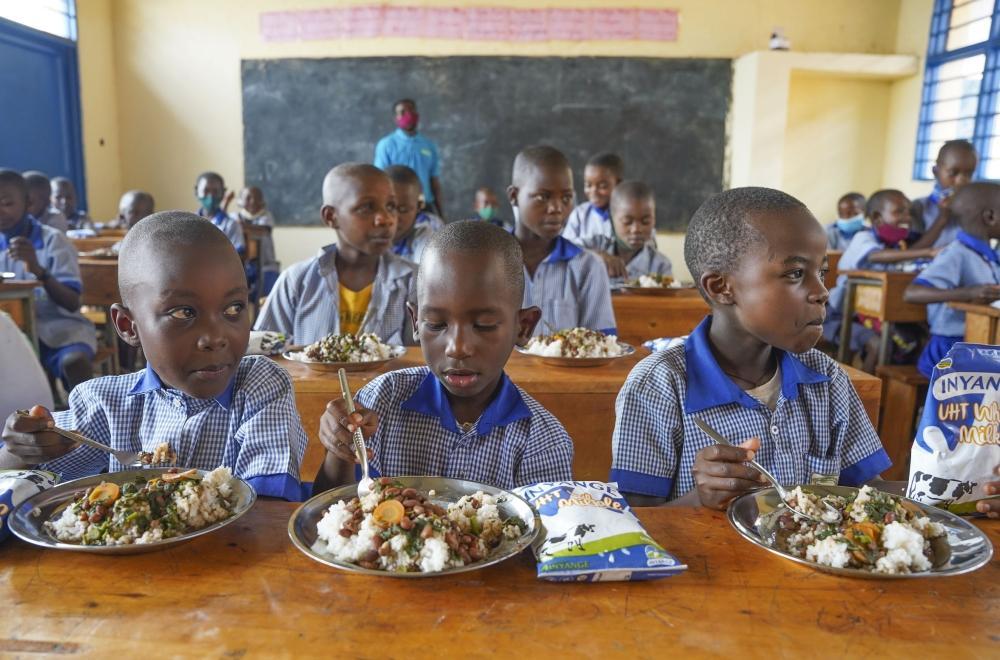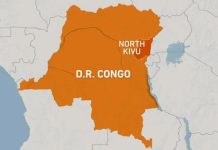Africa-Press – Rwanda. The ministries of Education and Agriculture have urged schools across the country to incorporate biofortified beans into their feeding programmes as the new academic year begins in September, in a push to strengthen child nutrition and learning outcomes.
Approximately five million learners from Early Childhood Development (ECD) centres to nursery, primary, secondary, and Technical and Vocational Education and Training (TVET) schools’ benefit from the national school feeding programme. Of these, 1.1 million are in ECD centres, while about 2.8 million are in primary school.
Research has shown that school feeding programmes boost attendance, cognitive development, and academic performance. The newly recommended bean varieties have been developed with higher levels of iron and zinc, nutrients critical to fighting malnutrition and improving brain function.
A controlled study in Rwanda involving female students found that consuming iron-biofortified beans improved memory and attention in just 18 weeks.
High-iron beans piloted in Kigali
According to Sam Ngabire, a school feeding specialist at the Ministry of Education, the introduction of high-iron beans into school meals has already delivered promising results.
“We are now introducing improved high-iron beans to feed our children in schools. Some schools have already gained access to these nutrient-rich beans. The programme was successfully piloted in Kigali, where schools also cultivated the beans in their gardens. At least 600 grams of seed were distributed to each school, and the resulting harvest was 36 kilogrammes, showing high productivity,” he said.
The pilot was supported by the Alliance of Bioversity International and the Centre for Tropical Agriculture (CIAT), through the Pan-Africa Bean Research Alliance (PABRA).
A three-year initiative, the Sustainable School Feeding Innovations in Kigali (SSFI) project aims to scale up the use of biofortified beans in school meals between 2024 and 2026. In 2024 alone, the project reached 277,566 students across 195 schools in Gasabo, Kicukiro, and Nyarugenge districts.
A study under the project revealed that 73% of schools have established gardens for iron-bean production. Beans remain the most widely served food in schools, with 97% of institutions including them in their menus, often up to five times a week.
Fighting iron deficiency
Emmanuel Dusingizimana, Head of the Schools Organisation (HOSO), emphasised that iron deficiency remains one of the most common and harmful forms of malnutrition, weakening immunity, draining energy, and impairing concentration and memory.
“By integrating high-iron beans into the school feeding programme, we’re not just feeding children — we’re fuelling their potential. By sourcing beans from local farmers, we also strengthen rural economies, create market stability, and support value chains,” he said.
He called for prioritising high-iron beans in every school meal, expanding production nationwide, and ensuring the provision of quality seeds and inputs for Rwanda’s 4.5 million school-aged children.
Closing the yield gap
Solange Uwituze, Acting Director-General of the Rwanda Agriculture and Animal Resources Development Board (RAB), noted that while beans are Rwanda’s main staple, productivity remains low.
“On average, each Rwandan consumes over 100 grams of beans per day. However, our national average yield is only 800 kilogrammes per hectare, compared to two tonnes for bush beans and four tonnes for climbing beans under controlled conditions. That gap is the challenge we must address,” she said.
Rwanda has the world’s highest per capita bean consumption — an estimated 164 grams per person per day, or about 34 kilogrammes annually. Beans account for nearly 28% of cultivated land and provide roughly 32% of calories and 65% of protein intake nationwide.
RAB scientist Edouard Murwanashyaka disclosed that five more bean varieties will be released in the coming years, each capable of yielding more than 4.5 tonnes per hectare and biofortified for improved nutrition and disease resistance.
Partnerships for innovation
Mark Cyubahiro Bagabe, Minister of Agriculture and Animal Resources, confirmed that Rwanda has renewed its partnership with the Alliance of Bioversity International and CIAT to introduce innovations such as fortified and quick-cooking bean varieties.
“Our priorities include developing blended financing models to close funding gaps, scaling up climate-smart agriculture and fortified bean technologies, and promoting high-yielding, disease-resistant crops,” he said.
Wanjiru Kamau-Rutenberg, Africa Managing Director for the Alliance of Bioversity International and CIAT, added: “Over the past decade, we have invested around $20 million in agricultural research in Rwanda, focusing on beans, nutrition, climate change, and gender equality. More than 40 improved bean varieties have already been introduced.”
For More News And Analysis About Rwanda Follow Africa-Press






